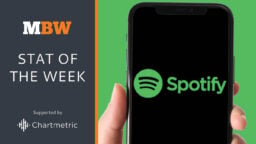Overall growth of Germany’s music market in 2016 was up for the fourth consecutive year by 2.4% in 2016 to €1.58bn.
That’s according to initial estimates from local commercial body the Federal Music Industry Association (BVMI), based on retail sales (including VAT).
While the rise is worth celebrating, growth is flatter than 2015, when numbers were up 3.9% to €1.54bn.
Streaming rose 73.1% to hit a market-share of 24.3%, while digital downloads are down 19.4% to account for 12.3% of the market, bringing digital’s overall share to 38%.
In 2015, streaming grew at a faster rate of 96.6%.
While the largest turnover is still generated by CDs, sales declined 9.6% YoY to account for a marketshare of 53.7%. Vinyl is up 41% to a 4.5% share.
In total, roughly 62% of sales were generated by physical products (CDs, vinyl, DVDs / Blu-rays).
German artists were at the top of the Official German Album Charts for 41 of 52 weeks.
Stärker als die Zeit (Warner Music) from Udo Lindenberg (pictured) was the most successful album in 2016, while Norwegian DJ Alan Walker boasts the top-selling single with Faded (Sony Music) spending ten weeks at the top of the Official German singles charts.
“The growth curve in 2016 might be slightly flatter than in the previous year, but it doesn’t take away from the current overall positive trend within the market.”
Florian Drücke, bvmi
BVMI Managing Director Florian Drücke: “The growth curve in 2016 might be slightly flatter than in the previous year, but it doesn’t take away from the current overall positive trend within the market.
“The fact of the matter is that the 2015 holiday shopping season was given a particular boost by a number of mega-selling albums, whereas 2016 had no equivalent.
“The streaming business was able to more than offset the decline in physical sales with a significant increase of 73%.
“Indeed, it was once more that unique mix of digital and analogue that fuelled and shaped the German market – and ultimately made for a convincing year in the music business”.
“Streaming has finally reached German consumers.”
Dr. Mathias Giloth, GfK Entertainment
Dr. Mathias Giloth, Managing Director of charts company GfK Entertainment, summarised: “The strong demand for music made in Germany continued unabated, continuing a trend that has emerged in recent years.
“The charts included representatives of all genres, including hip hop, pop, rock and metal. In other words, there was something for every type of music fan out there.
“In the Official German Singles Charts, the share of pop and dance music as well as music by international artists was more pronounced thanks to their inclusion on widespread popular playlists. Streaming has finally reached German consumers.”
In 2013, the income of the recorded music business in Germany increased by 1% to €1.45bn – the market’s first annual growth after five years of decline.
In 2014, the country’s recorded music business turned over €1.48bn, up 1.8% on 2013.
And in 2015, the market grew in value by 3.9% to hit €1.54bn – the first time industry income had surpassed the €1.5bn barrier since 2009.
Germany is still ahead of the UK in retail value terms – the British recorded music market earned £1.108 billion ($1.376bn) in 2016.
Last year, streaming became part of the weekly Official German Album Charts from BVMI/GfK.
There are, however, a few slightly stricter rules compared to charts which have done the same in other parts of the world.
Most notable is the fact that only streams from premium interactive audio services will count.
That means no Spotify free plays will contribute to the chart’s make-up, and neither will any ‘lean back’ digital streaming radio plays – even if someone has paid for it.
Like other territories such as the UK and US, only streams that are over 30-seconds long will count.Music Business Worldwide





